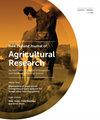机器人与冲击:新兴的蔬菜和耕地非除草剂杂草控制选择
IF 1.5
3区 农林科学
Q2 AGRICULTURE, MULTIDISCIPLINARY
New Zealand Journal of Agricultural Research
Pub Date : 2023-08-31
DOI:10.1080/00288233.2023.2252769
引用次数: 2
摘要
本文章由计算机程序翻译,如有差异,请以英文原文为准。
Robots and shocks: emerging non-herbicide weed control options for vegetable and arable cropping
ABSTRACT For decades, herbicides have provided easy-to-use, cost-effective weed management, but alternatives are desired. Consumer preference for chemical-free food, awareness of environmental impacts, regulation increasingly restricting agrichemical use, and increasing prevalence of herbicide resistance are forcing changes to weed management strategies. New Zealand farming must remain sustainable and profitable while responding to changes in its overseas markets, among which are increasing demands for regeneratively grown, safe, high-quality produce. Current reliance on herbicides should be reduced, with more emphasis on preventative management by cultural means, and weed suppression by alternative technologies. The emergence of agritechnologies incorporating automation, machine vision and artificial intelligence, and development of new techniques for weed destruction, offer alternatives that minimise or avoid the requirement for herbicides, avoid soil disturbance and can work effectively in high crop or crop-residue conditions. We have identified electric weeding as a feasible alternative and pulsed electric microshocks as a very low-energy option requiring a fraction of the energy of any other system. Pulsed microshocks enable an integrated weed management system for vegetable and arable crop production combining cultural controls and inexpensive pre-planting treatments with automated application of chemical-free in-crop weed control. Open-source software enables community development of autonomous deployment for niche crops.
求助全文
通过发布文献求助,成功后即可免费获取论文全文。
去求助
来源期刊
CiteScore
4.90
自引率
16.70%
发文量
31
审稿时长
3 months
期刊介绍:
The New Zealand Journal of Agricultural Research publishes original research papers, review papers, short communications, book reviews, letters, and forum articles. We welcome submissions on all aspects of animal and pastoral science relevant to temperate and subtropical regions. The journal''s subject matter includes soil science, fertilisers, insect pests, plant pathology, weeds, forage crops, management systems, agricultural economics, agronomy, and animal science. The journal also accepts crossover papers on subjects such as land –water interactions.

 求助内容:
求助内容: 应助结果提醒方式:
应助结果提醒方式:


